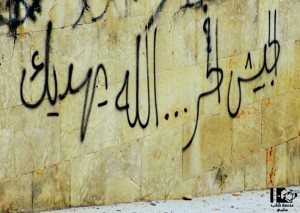Social Media Monitor 25-9-2012

“The Battalion of Saddam Hussein” joins Free Syrian Army
Free Syrian Army fighters announcing the formation of the Martyr Saddam Hussein Battalion
The formation of the Battalion of Martyr Saddam Hussein of the Free Syrian Army, FSA, aroused a lot of controversy among Syrian activists. While many were outraged by the commemoration of the Iraqi dictator, others approved the name and considered Hussein an Arab, Sunni hero.
The following are some of the comments written in different social media websites.
Abu Omar criticized the formation of the battalion and questioned the reasons behind supporting such groups.
“When [FSA] groups are loyal to their sponsors, be they Syrian opposition figures or other countries … the revolution will not lead to victory; it will give rise to warlords,” he wrote on the Free Syrians’ Group Facebook page. Abu Omar also criticized “the random battalion names as if they were commercial brands.” Abu Omar described the new battalion’s name as “the latest joke.”
The new name also reached the Iraqi blogosphere.
On The Voice of Iraq blog, journalist Faleh al-Darraji expressed his consternation at the name.
“How shameful it is for this ‘revolution’ that its ‘free army’ forms a battalion in the name of ‘the martyr’ Saddam Hussein,” Darraji wrote. “As if this revolution needed the formation of the battalion named after Saddam Hussein, who was the biggest tyrant of the twentieth century… I do not know how people suffering from tyranny can call for freedom under the name of a dictator and a criminal.”

Hasouna al-Hasoun argues that Saddam Hussein helped the “revolution” in the eighties when he supported the Muslim Brotherhood against the regime, even though Iraq was engaged in a war against Iran at the time.
“During the eighties, when the revolution needed weapons and anti-aircraft missiles, they asked Iraq for it at a time when the war against the Safavid State was at its peak. Saddam Hussein provided the revolution with SAM 6 rockets without hesitation,” Hassoun wrote on The Assembly of Damascus and Its Countryside’s Youth Facebook page. The term ‘Safavid’, the name of a Persian dynasty that existed from the sixteenth to the eighteenth centuries and led several conquests against the Ottoman Empire, is usually used by Sunnis critical of Iran, suggesting it is trying to build a new empire at the expense of Sunni Arab countries.
Journalist at Al Safa TV and son of the Salafi cleric Adnan al- Ar’our, Hazem al-Ar’our (HazemAlarour@), tweeted, “the leaders of the battalion are not in favor of the oppression committed by [Saddam Hussein].” He suggested instead that they chose this name because they see Hussein as someone “who stood in the face of Iran and fought its expansion.”.
National Salvation Conference in Damascus
In its concluding statement, the National Salvation Conference held in Damascus called for a peaceful “overthrow of all of the Syrian regime’s symbols.” The conference was organized by the National Coordination Board, NCB, accused by the rest of the opposition of being supporters of the regime. The conference was highly criticized by opposition activists.

Writer Rima Fleihan, who left Syria after the outbreak of the revolution for security reasons, expressed her surprise in a comment she wrote on Facebook that the conference took place in an area controlled by the regime. Fleihan mocked the NCB’s “ability to hold the conference inside Syria and have it covered by media, including official and [semi-official ones].”
Syrian physician Ahmed Ibrahim, resident of Saudi Arabia, commented sarcastically on the presence of both the Russian and Chinese ambassadors.
“Under the slogan ‘No to foreign intervention’… the Russian Ambassador inaugurated the conference,” Ibrahim wrote on Facebook.
Syrian writer Sobhi Hadidi (SubhiHadidi@) criticized participants in the conference on twitter: “It’s both funny and surreal that the [organizers] assumed that the goal behind the arrest of the three [NCB] leaders was to obstruct the conference, as if the conference was taking place in spite of the regime.”
Following the campaign accusing the NCB of treason, Tony Saade wrote on the Top Comment Facebook page: “Those who accuse others of treason or try to marginalize them …lack morality, as well as an intellectual, political or cultural sense … They are cultural mercenaries .”
Sectarianism still on the rise
Many opposition activists are addressing the rise of sectarianism in Syria.
Syrian writer Fouad Humera mentioned Syrian minorities, particularly the Alawite sect.

“Around 20,000 victims from the Alawite sect have fallen and still the Alawites defend the Syrian regime, which has systematically impoverished them to make them its servants,” Humera wrote on Facebook. “The solution is to stop thinking as minorities and start thinking as Syrian citizens.”
Journalist Karim al- Afnan criticized the sectarian mentality.
“The cohesion of sects means a weak country, it also means that a lot of people will die for no reason,” he wrote on Facebook.
Nour Abu Assleh published a photo of a banner that was held at a demonstration in Damascus on her Facebook page. The banner speaks proudly of belonging to the Sunni sect. Abu Assleh commented: “Dear banner holder, when you show off your religion/sect, and then claim that we are one nation, make sure to know that you are schizophrenic.”
Writer Thaer Deeb, currently a resident of Beirut, expressed his disbelief that talking to people with a sectarian mindset would result in anything.
“When will those who send messages to the Christians, Sunni, Alawites understand that no one cares about what they write?” he wrote on Facebook.
Syrian journalist Shadi Bou Karam posted on Facebook a photo of himself holding a banner against sectarianism. Opinions varied in regard to the photo. The banner said: “Children should not hear such words like Sunni, Shiite, Alawite, Druze, etc. These are obscene words.”
